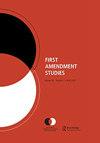关于“第一修正案研究”的演变和定义:我们都从事第一修正案研究吗?
Q2 Social Sciences
引用次数: 0
摘要
大约20年前,当我开始对《第一修正案》进行学术研究时,这些主题似乎相当直截了当。该杂志当时被命名为《言论自由年鉴》,并讨论了一些最传统的第一修正案问题。该杂志早期的文章是由富兰克林·海曼和罗伯特·奥尼尔等学者撰写的,内容包括回顾当年法院关于言论自由的法律裁决,大学校园中言论自由的实践,第一修正案研究的参考文献,以及我认为的第一修正案的核心问题,如广播媒体的审查制度,政治抗议活动,包括焚烧国旗等争议,以及针对第一修正案问题对特定法学家的审查。随着时间的推移,我们看到第一修正案研究的性质激增,越来越多传统上与第一修正案无关的学科领域成为第一修正案问题。这也意味着,那些可能从未认为自己是第一修正案学者的学者,现在发现自己正在研究第一修正案。例如,对农业研究感兴趣的学者可能从未想过自己会成为研究食品诽谤案件的第一修正案学者。枪支权利学者可能没有想到自己会成为第一修正案学者,研究涉及打印和分享枪支3D蓝图自由的案件。技术专家可能从来没有想过自己会争论第一修正案的权利在多大程度上适用于人工智能(比如亚马逊的Alexa),或者深度造假的发展。科学家们可能没有想到自己会研究第一修正案关于克隆人实验的自由(也就是说,实验是克隆思想的表达)。这样的例子不胜枚举。这些不同领域的学者越来越多地发现自己碰到了第一修正案的问题。我认为可以想象的是,如果我们还没有,我们所有人都将在我们学术生涯的某个时候,至少以某种小的方式研究第一修正案。因此,对于《第一修正案研究》杂志来说,在我们不断发展的环境中,作为一个集中讨论第一修正案问题的性质和范围的地方变得越来越重要。作为编辑,我认为有必要强调该期刊的两个重要特征。我相信,这些特征中的每一个都将为解决第一修正案研究的演变提供一种清晰的方式,以便继续研究该期刊历史上发现的核心第一修正案领域,同时也本文章由计算机程序翻译,如有差异,请以英文原文为准。
On the evolution and definition of ‘First Amendment studies’: Do we all engage in First Amendment studies?
When I began my academic study of the First Amendment about 20 years ago, the topics seemed pretty straightforward. The journal was then named Free Speech Yearbook, and took on some of the most conventional First Amendment issues. The early essays of the journal were written by scholars like Franklyn Haiman and Robert O’Neill and included topics like reviewing the year’s legal rulings in the courts about free speech, the practice of free speech on college campuses, bibliographies of First Amendment research, and what I would consider to be core First Amendment issues like censorship in the broadcasting medium, political protests including controversies like flag burning, and the examination of specific jurists on First Amendment issues. Over time, we have seen the nature of First Amendment studies proliferate as more and more subject areas that were not traditionally associated with the First Amendment have become First Amendment issues. This has also meant that scholars who may have never thought about themselves as First Amendment scholars are now finding themselves studying the First Amendment. For example, scholars that are interested in the study of agriculture may have never envisioned themselves becoming First Amendment scholars in cases about food libel. Gun rights scholars may not have envisioned themselves being First Amendment scholars in the study of cases involving the freedom to print and share 3D blueprints of guns. Technology experts may never have envisioned themselves making arguments about the extent to which First Amendment rights apply to artificial intelligence (like Amazon’s Alexa), or of the advancement of deep fakes. Scientists may not have envisioned themselves studying the First Amendment freedom to experiment with human cloning (i.e., the experiment as the expression of the idea of cloning). The list goes on and on. Scholars in these different areas are increasingly finding themselves bumping into First Amendment considerations. I think it is conceivable that, if we are not already, all of us will study the First Amendment in at least some small way at some point in our academic careers. Therefore, it has become increasingly important for the First Amendment Studies journal to serve as a place to centrally converse about the nature and scope of First Amendment issues in our evolving landscape. As Editor, I find it noteworthy to highlight two important features of the journal. Each of these features, I believe, will provide a clear way of addressing the evolution of First Amendment Studies in order to continue studying the core First Amendment areas found in the history of the journal, while also
求助全文
通过发布文献求助,成功后即可免费获取论文全文。
去求助
来源期刊

First Amendment Studies
Social Sciences-Law
自引率
0.00%
发文量
0
期刊介绍:
First Amendment Studies publishes original scholarship on all aspects of free speech and embraces the full range of critical, historical, empirical, and descriptive methodologies. First Amendment Studies welcomes scholarship addressing areas including but not limited to: • doctrinal analysis of international and national free speech law and legislation • rhetorical analysis of cases and judicial rhetoric • theoretical and cultural issues related to free speech • the role of free speech in a wide variety of contexts (e.g., organizations, popular culture, traditional and new media).
 求助内容:
求助内容: 应助结果提醒方式:
应助结果提醒方式:


